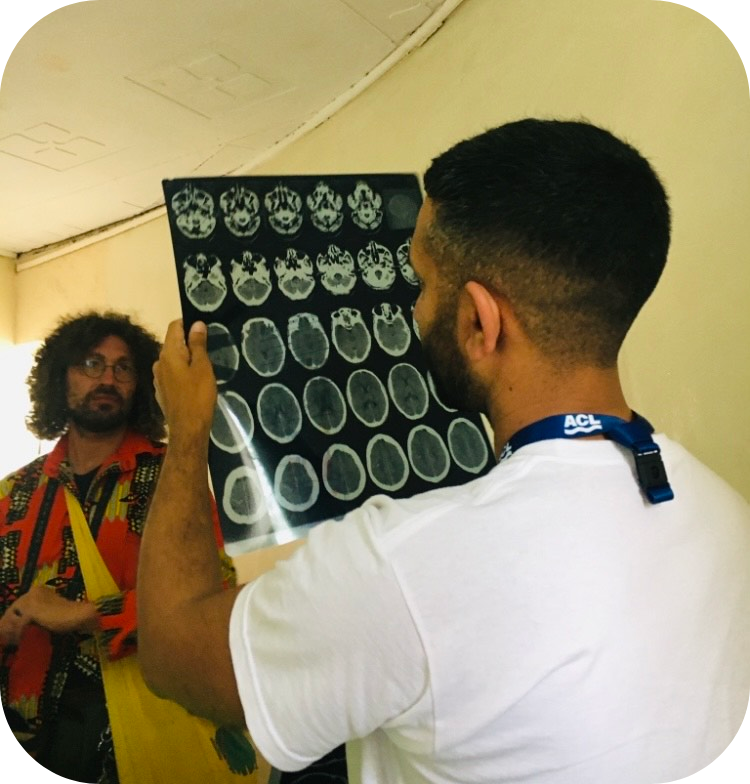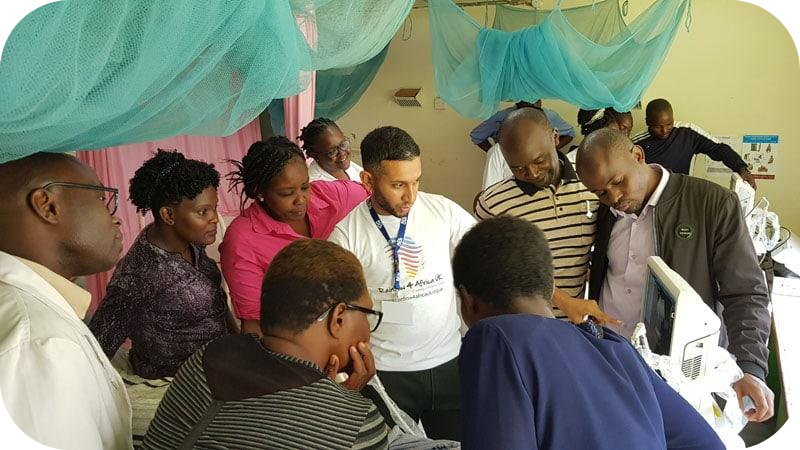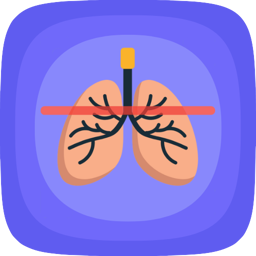Dr. Mohamed Chunara
Dr Chunara is a Consultant Radiologist at Arrowe Park Hospital in Merseyside, with a subspecialty interest in gastrointestinal imaging. In addition to his clinical role, Dr Chunara also works as the Trust Specialty Training Lead at the North West Imaging Academy, and has a key role in "Rainbow 4 Africa", a charity providing ultrasound imaging and training in deprived areas of Africa
Where did you do your radiology registrar training? How was the experience?
Did you do anything else before entering radiology training?
What does an average week as a Consultant Radiologist look like for you?
What is the best part of your job?
What is the worst part of your job?
Can you tell us about the charity work you do for Rainbow 4 Africa?
What do you think about AI in radiology? Will it be taking over our jobs?
How can a candidate who wants to get into radiology best prepare themselves for applying?
Where did you do your radiology registrar training? How was your experience?
"Mersey was amongst the highest-ranked deaneries in the GMC survey when I applied for radiology and, being reasonably close to my home town, it was a no-brainer. Having been through the training scheme, and now still in the region as a Consultant, I have many positive things to say about the deanery. A good balance of university/non-clinical learning environment teaching, coupled with on-the-job exposure, keeps the week varied, and the mind engaged. Trainers are excellent overall and the supervised collaborative on-call has many advantages when starting out as an ST2 on-call."
Did you do anything else before entering radiology training?
"Nope - out the frying pan and straight into the fire, I made the transition from F2 straight to ST1 Clinical Radiology."
What does an average week as a Consultant Radiologist look like for you?
- Monday: OFF
- Tuesday: GI CT reporting AM, General Ultrasound PM
- Wednesday: GI MR reporting AM, MDT prep and/or acute MRI PM
- Thursday: Liver MDT remote AM, Academy Deanery Role PM
- Friday: Inpatient CT AM, Colorectal MDT PM On-call: approximately 1 in 12
What is the best part of your job?
"I was going to say I enjoy it all which is far too cliche so, to answer the question directly, acute or hot CT is always filled with interesting pathology, no matter how many years of experience you have, and so this is probably one of the sessions I enjoy most. There’s always a case with an ominous presentation that gets the brain cogs turning." "Sort of linked to this, particularly for the more complex cases, you get the chance to discuss the patient with varying members of the clinical team (junior medical staff, senior medical staff, nurses, allied professions etc), and I must say I do enjoy this bit. Don’t underestimate how much you can learn by asking the surgeon to show you what a side-to-side anastomosis or J-pouch looks like. The very best surgeons I know take the time to sit with you and help you understand their approach/terminology so that ultimately, your report is useful and relevant."
What is the worst part of your job?
"MDT prep is the easy answer here, mainly because there is often little time to deal with very complex cases. Notwithstanding the “non-cancer” cases that sometimes populate “cancer” MDT lists. This is an ongoing issue that many of my colleagues tell me is true for them too, but there are ways to address this and attempt to make it better. For example, our local trust has implemented an MDT passport/proforma that is updated every time a patient is listed for discussion. This keeps a succinct and contemporaneous record of the patients journey through the MDT, something which will hopefully lead to a more efficient MDT experience for all in the future."
Can you tell us about the charity work you do for 'Rainbow 4 Africa'?
Rainbow 4 Africa (R4A) is a UK based charity that provides direct healthcare to patients in addition to training local healthcare professionals in deprived areas of Africa - find out more here.
"My initial engagement with R4A was a completely serendipitous one, having been made aware by my wife that her colleague was the chairman of a local charity, and that he was planning a trip to Kenya with a big focus on ultrasound. He had himself heard that a new starter at the GP practice (my wife), had a husband who was a radiologist (me), and so we arranged to meet up." "I’ve always wanted the “humanitarian” experience, and they needed someone who had a handle on ultrasound. Within 6 months, we were out there. It was an experience like no other, for reasons far too numerous to convey in this short (ish) answer. Pertinently however, what I will say, is that I realised just how varied healthcare delivery is in certain parts of the world. Despite this, it was incredible to see how strong a resolve the local clinicians had to up-skill themselves, in an effort to improve patient care. The desire to learn was second-to-none, and our on-the-ground ultrasound training proved to be a resounding success, attracting the attention of other large international charities." "The charity is multidisciplinary and relies on the exceptional work of several GP’s, a physician associate, nursing colleagues, local clinicians in Africa, and myself. I’m sure I’ll have missed some out, but you get the gist. Everyone has a crucial role to play, and it is the combined effort of all that ultimately has the biggest impact."
What do you think about Artificial Intelligence (AI) in radiology? Will it be taking over our jobs?
"AI is already here in radiology, and we are using it locally for stroke patients, in cardiac imaging, and radiograph interpretation to name just a few AI tools. But, despite all the promises, there are still issues to work through, and for all its potential, I am a strong believer that we as radiologists are here to stay." "I do think AI will change the way we work, but the crucial role a radiologist plays in the MDT setting, the ability to work through differentials whilst talking to colleagues, educating others, and the practical skills offered by both diagnostic and interventional radiologists, are just a few examples of things that aren’t as easily replaced by a computer as you might think." "Ultimately, my opinion is that those who embrace AI and use it as a tool to augment their practice will do well, and that is is better to steer away from the voracious arguments that AI has no role at all in imaging. That, as we now know, has been proven wrong."
Having completed radiology training, would you still recommend it as a speciality to prospective candidates?
"Unequivocally, yes. I can’t see myself doing anything else having now experienced such an incredible and varied specialty." "Don’t let someone put you off by saying you’ll lose patient contact. There are plenty of ways to maintain this in radiology from ultrasound, to dynamic fluoroscopy, and rapidly developing areas like interventional radiology. There are opportunities to communicate with and also treat patients, face-to-face, for all appetites." "Remember as well, that for those who enjoy being on the fringes, there are very few areas of medicine that offer the remote working opportunities that radiology provides. For example, there are several radiologists that report for the U.K. from sunnier parts of the world (assuming it is somewhere that you can get a secure, stable, high-speed internet connection)!"
If you were interviewing prospective candidates, what would be the most important things you'd be looking for?
"Attention to detail, a varied background in medical / surgical / community specialties, and an understanding of applied anatomy/pathology are crucial skills to be a good radiologist." "A decent taster week is obviously recommended to ensure the candidate has a recent grasp for what the job involves. Radiology audits, projects, presentations etc are a bonus (some may argue these are now necessary given the competition). The RCR website has several audits (RCR audit recipes) to look through if this is something one is considering during their Foundation training etc." "Commitment to the speciality by demonstrating several of the things listed above, as well as recognising relevant areas of current discussion - credentialing, community diagnostic hubs, regional imaging networks, teleradiology, faster diagnostic standards for cancer and non-specific symptom pathways etc."
How can a candidate who wants to get into radiology best prepare themselves for applying?
"Find a group of successful ST1 candidates and take their advice. A list of these should be readily available through the local radiology training lead clinician (TSTL). Prepare early and be organised. Know how the point allocation system works and target your time to high score yielding activities appropriately."
GetIntoRadiology
Copyright © 2022 GetIntoRadiology.co.uk. All rights reserved.


